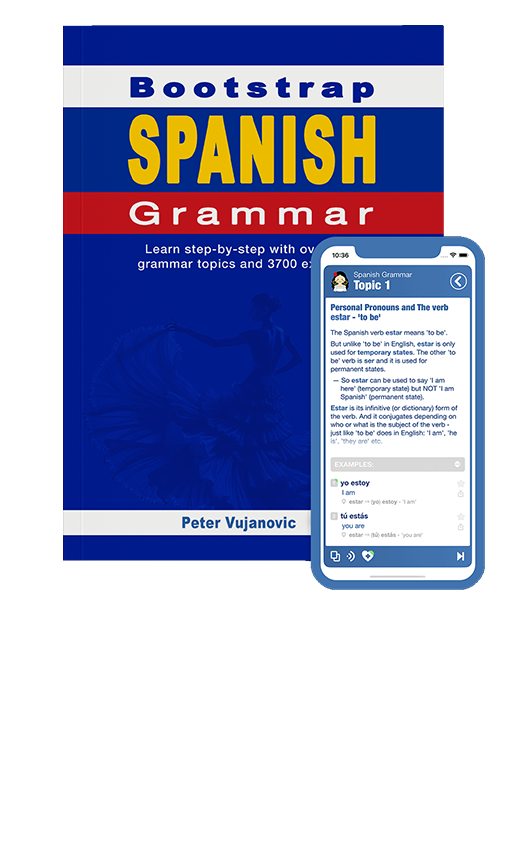Spanish grammar - Because' - porque, ya que, puesto que and como |
|||
|
|||
There are three common ways to say 'because' in Spanish: • porque - very commonly used to mean 'because'. • ya que - also common, used similarly to 'since' or 'because'. • puesto que - used in more formal contexts but still found in colloquial speech. These can often be used interchangeably, but porque cannot start a sentence. • como means 'given that', 'as', or 'since'. It typically begins a sentence to set up a reason for some result. |
| Examples: | |
|
El perro ladra porque ve a un extraño.
The dog barks because it sees a stranger.
|
|
|
La tienda cierra porque no hay clientes.
The store closes because there are no customers.
|
|
|
Los niños juegan en el parque porque hace buen tiempo.
The children play in the park because the weather is nice.
|
|
|
El profesor explica lentamente porque los estudiantes no entienden.
The teacher explains slowly because the students don't understand.
|
|
|
Los empleados trabajan horas extra porque hay mucho trabajo.
The employees work overtime because there is a lot of work.
|
|
|
El gato duerme porque está cansado.
The cat sleeps because it is tired.
|
|
|
El coche no arranca porque la batería está descargada.
The car doesn't start because the battery is dead.
|
|
|
La película empieza tarde porque hay problemas técnicos.
The movie starts late because there are technical problems.
|
|
|
La familia no sale de vacaciones porque quiere ahorrar dinero.
The family doesn't go on vacation because they want to save money.
|
|
|
El restaurante está vacío porque es muy caro.
The restaurant is empty because it is very expensive.
|
|
|
El jefe está contento, ya que el proyecto está terminado.
The boss is happy since the project is finished.
|
|
|
Los estudiantes estudian, ya que tienen un examen mañana.
The students study since they have an exam tomorrow. |
|
|
Las plantas crecen rápido, ya que reciben mucha luz.
The plants grow quickly since they receive a lot of light.
|
|
|
Los vecinos no se quejan, ya que la fiesta es tranquila.
The neighbors don't complain since the party is quiet.
|
|
|
El tren llega a tiempo, ya que no hay retrasos.
The train arrives on time since there are no delays.
|
|
|
El niño no va a la escuela, puesto que está enfermo.
The child doesn't go to school since he is sick.
|
|
|
La empresa contrata más personal, puesto que necesita cubrir más puestos.
The company hires more staff since it needs to fill more positions.
|
|
|
El libro es popular, puesto que la historia es interesante.
The book is popular since the story is interesting.
|
|
|
La reunión se cancela, puesto que no hay suficientes asistentes.
The meeting is canceled since there are not enough attendees.
|
|
|
El parque está cerrado, puesto que están haciendo mantenimiento.
The park is closed since they are doing maintenance.
|
|
|
Como es fin de semana, la tienda está llena.
Since it is the weekend, the store is full.
|
|
|
Como hay tráfico, salimos temprano.
Since there is traffic, we leave early.
|
|
|
Como es su cumpleaños, le compramos un regalo.
Since it is his birthday, we buy him a gift.
|
|
|
Como está soleado, vamos a la playa.
Since it is sunny, we go to the beach.
|
|
|
Como el examen es difícil, todos estudian mucho.
Since the exam is difficult, everyone studies a lot.
|
|
|
Como la clase es interesante, los estudiantes prestan atención.
Since the class is interesting, the students pay attention.
|
|
|
Como no hay electricidad, usamos velas.
Since there is no electricity, we use candles.
|
|
|
Como el concierto es gratis, mucha gente asiste.
Since the concert is free, many people attend.
|
|
|
Como hay descuento, compro dos entradas.
Since there is a discount, I buy two tickets.
|
|
|
Como es temporada de frutas, el mercado está lleno.
Since it is fruit season, the market is full.
|
|
 |
|



